- Home
- Chris Grabenstein
Whack A Mole: A John Ceepak Mystery (The John Ceepak Mysteries) Page 4
Whack A Mole: A John Ceepak Mystery (The John Ceepak Mysteries) Read online
Page 4
“Danny?”
It's Cap'n Pete, behind me.
“Hey!”
“Johnny here?”
“Not yet. But he called me, so I know he's on the way.”
“You want a pop while we wait?”
“Sure.”
“Come on, laddie.”
He unlocks the door. Inside his office, he keeps one of those old-fashioned Coke coolers, the kind with the thick aluminum sides where you lift open a lid and sink your arm into icy water to fish out your favorite kind of soda. Pete calls it “pop” because he and his mom moved down here from Chicago. Must be why he keeps the Mike Ditka mustache, too. I think when they first came to town, Mrs. Mullen hired a different captain every summer. When Pete hit eighteen, he took over the full-time skipper duties, even got the official yacht cap with the gold cord and life-preserver-plus-anchors patch.
“Who wants a pop?” he says—and all of a sudden the parrot flaps its wings and shrieks, “Who wants a pop?” Pete must've flicked the plastic bird's switch before he came out back to find me.
“Polly wants a pop!” he cracks, and the bird, of course, parrots it right back. Pete is chuckling so hard I think his baggy-butt jeans are going to slide down another inch.
Ceepak pulls up to the pier on his sixteen-speed trail bike.
“Evening, Captain.”
“Evening, Johnny,” says Pete. Then the parrot flaps and says it: “Evening, Johnny.” It's getting pretty annoying. Danny wants Polly to stick a cracker in it.
Fortunately, Pete decides it's time to flip the switch off.
He unlocks the office door. “Come in and look at my pirate booty!”
I fish a Stewart's Orange Cream soda out of the cooler. Ceepak passes.
“You sure?”
“No, thank you. I had a root beer earlier.”
“With Rita?”
“Roger that.”
Pete is in the back room retrieving his find.
“Give me a second, guys,” he calls out from behind the thick curtains, which look like old army blankets. “I put my little treasure in a shoebox. Now, I just have to remember where I put the shoebox!” More laughs. He cracks himself up sometimes.
“Take your time,” says Ceepak.
“So, where's Barkley?” I ask.
“Sleeping on the sofa.”
Suddenly, I want to tease him. I don't know why. Maybe it's an orange-pop-induced sugar rush. Maybe it's because my last female companion stole my emergency twenty. Whatever the reason, I'm in the mood to bust my partner's chops again, to give him a little grief about his girlfriend. Maybe it's because I don't have one myself.
“So,” I say, knowing, of course, that John Ceepak cannot tell a lie, “is Rita up there with Barkley?”
“10-4.”
“Is she gonna spend the night with you guys?”
Pete steps into the office with his shoebox.
“Affirmative,” says Ceepak.
Poor guy. He's blushing—but The Code won't let him fib, fudge, or weasel.
“She's sleeping over two nights in a row? Awesome.” I flash a manly wink at Cap'n Pete.
Pete doesn't wink back.
He's grinning but I can tell it's a strain. In fact, he looks the way the old nun from elementary school used to look whenever she caught us upside down on the monkey bars practicing our swear words.
“So,” I say, quickly changing the subject, “you found a charm bracelet, hunh?”
“Yep,” says Pete. “I got lucky for a change. All it took was following in the footsteps of our able friend here. I went back to where you found that ring, Johnny.”
“Oak Beach?”
“Right. Figured it might not be a bad idea. Might be something else buried there. It was just a hunch—but it paid off!”
He puts the box on the desk and angles down a gooseneck lamp so we can better see his find.
“I tried not to touch anything. Just like you said at the meeting. Pulled it out with hot dog tongs.”
“Let's see,” says Ceepak. He snaps open the cargo pants pocket where he packs his tweezers.
He snags the bracelet and holds it up under the light. The gold still sparkles in spots. Now he pulls out his photographer's bulb-brush. He keeps that one in his knee pocket. He gently dusts the charms.
“A charm bracelet is like a piece of frozen—or, in this case, buried—history.”
“We're all ears,” I tell him. Pete nods agreement.
Ceepak pulls a magnifying glass out of yet another pocket. Clearing his throat, he begins. “The wearer went to the 1984 World Expo in New Orleans, Louisiana. Or else someone brought her back a souvenir.”
“What else?” I ask. Come on—that one was pretty easy.
Ceepak fingers another of the charms.
“I also suspect this young lady was an Italian-American. She liked rock music and cats. And she either enjoyed going to church or someone encouraged her to do so.” Go, Sherlock.
He shows us the little Fortuna, the curved goat-horn that Italians say wards off the evil eye. Next comes a tiny electric guitar, then two kittens in pounce poses, and a silver church with a steeple.
“Mary,” says Cap'n Pete. “Her name was Mary!” He sounds like a gypsy reading Tarot cards.
I point to the last charm, the one cut in the silhouetted shape of a girl's head. “Because that's what's engraved on the back side of that one, right?”
Pete looks properly mysterious. For an instant.
“That … and this.”
He holds up the shoebox with both hands like he's the high priest in Raiders of the Lost Ark right before all hell breaks loose and the Nazis melt.
“I told you I had her picture.”
He turns over a plastic bag sitting in the bottom of the box to reveal a cutout panel from a wax-paper milk carton. It's one of those missing children mug shots. A teenage girl, seventeen or eighteen. I read her name: Mary Guarneri.
“This was buried in the same spot as the bracelet,” he explains. “Look!” He points to the top edge of the cardboard.
Embossed letters read AUG 12 85.
I say what we all know: “The milk's expiration date.”
CHAPTER NINE
I head back to The Sand Bar.
It's only about nine P.M. but Jess and Olivia are long gone.
Four sorority sisters sipping Aqua Velva-blue cocktails now occupy our table on the upper deck. They wear neon-green wristbands to prove they're old enough to get smashed. They shimmer in Lycra sundresses and muscle-cut T-shirts to show off gym-sculpted muscles and their honey-colored skin.
I love the sentiment stretched across the chest of the blondest blonde: NEW JERSEY. ONLY THE STRONG SURVIVE.
I head back down the steps.
It's still the weekend for another three hours. I figure I'll spend it flirting with Debbi, the bartender whose work outfit usually involves tattered logo wear and torn-off short shorts with frayed threads trickling down her thighs. On Debbi, it works. Trust me.
When I reach the bottom of the staircase, I feel like Jacques Cousteau fighting his way through a school of scantily clad tropical fish. All the girls flash ultra-bright smiles because teeth look even whiter when faces go cocoa brown. All of them are twentysomething. They're loose and giddy, made merrier by mango margaritas and pineapple martinis and raspberry mojitos—all served in frosty plastic cups instead of glasses so nobody will be seriously injured once they're totally tanked and start dropping their drinks.
Strings of Coors Light and Bud Light and Corona Light pennants flutter overhead. It looks like the grand opening of an indoor gas station that only pumps low-cal beer.
Lots of T-shirts call out to me as I sidle through the crowd. They're like personal ads these beach bunnies can post on their chests. I see JERSEY FRESH on one. MEN SHOULD BE LIKE DESSERT: SWEET AND RICH on another. One babe seems particularly pleased with hers: on the front it instructs passersby to REMEMBER MY NAME, while on the back it says, YOU’LL BE SCREAMING IT ALL
NIGHT.
Oh, the poor neighbors.
But I'll spend my night wondering about Mary Guarneri and who buried her charm bracelet on Oak Beach along with her picture from a milk carton stuffed inside an old-fashioned sandwich bag.
It was Ceepak, of course, who had pointed out that the plastic bag was a relic of School Lunches Past.
“See how the flap tucks in?” he said. “No Ziploc top. No yellowand-blue-makes-green sealing strip. Those were all technological advances yet to come.”
Yes, thanks to my partner, I now know the sandwich bag development timeline.
Ceepak is big on the forensic stuff. In fact, he started the whole metal-detecting, treasure-hunting deal as a way to further hone his investigative skills in the downtime between cases. He finds stuff buried in the sand, takes it home, and tries to decipher its secrets.
You or I might find a coat button on the beach and fling it at an overly annoying sea gull. Ceepak picks up the same button and does enough homework to tell you it most likely came off a very expensive fur coat purchased at Bergdorf's in 1959 and that, coincidentally, the mayor's wife had worn just such a fur coat to the beach one December day back in the early 1960s when Santa Claus used to kick off the Christmas shopping season by coming ashore in a lifeguard's row boat. Then, he'd whip out a Xeroxed article from the December 5, 1962, issue of the Sea Haven Sandpaper and hover his magnifying glass over the accompanying photo to show you where Mrs. Ellen Bullard, the mayor's wife at the time, was missing a button on her coat.
“Why do you think the bracelet was buried?” Cap'n Pete had wondered.
“It's unclear,” Ceepak had replied. “We don't have enough information, just two pieces of a larger puzzle.”
However, he did have more factoids to share with us.
For example, the use of milk carton panels to spread information about missing children wasn't initiated until the mid-1970s. A missing New Yorker named Etan Patz was one of the first so-called “milk carton kids.” The use of this breakfast table search technique hit its peak in the 1980s.
Of course, the World Expo charm had already placed our time capsule in the ’80s. So had Mary's hairdo. Very Charlie's Angels.
Ceepak also brought up Lisa DeFranco—she of the jerk-for-an-exboyfriend and the miserable-excuse-for-a-mom. After all, the same stretch of sand had yielded the 1983 class ring she'd been given.
“Unlike Ms. DeFranco, Mary Guarneri had concerned people actively searching for her. We should be able to learn what happened to her. Perhaps she eventually came home. Or a body was found.” He uttered this last possibility with appropriate gravity.
Cap'n Pete closed up the shoebox. He handed it over to Ceepak, entrusting him with its hidden truths. “I hope you find us an answer. I surely do….”
Ceepak said he would try his best.
Me, I was going back to The Sand Bar.
Tonight is not my night.
I finally find a stool at the bar but Debbi, my tattered T-shirt temptress, is not the bartender. I guess she doesn't work Sundays anymore. Instead, I get Ralph.
“Hey, Danny.”
“Hey, Ralph.”
We're both kind of bar-shouting—speaking loud enough to be heard over the din of drunks.
“Where's Katie?” Ralph asks.
“California.”
He nods. Small talk is officially over. “What are you drinking?”
“Beer.”
“Bud?”
“Yeah.”
“Glass?”
“Nah.”
He marches over to the cooler to fish me out a longneck.
Ralph has been doing this bartending gig way too long. He's about forty-five and hates his job. I know this because I worked here one summer as what they call a “bar-back.” I was the guy who went downstairs to the ice machine and scooped up the five-gallon buckets of cubes to dump into the ice bin. Mostly, I stood around and cleaned glasses and listened to Ralph gripe about the “skanks” and “sluts” he had to serve.
Ralph looks angry, too. Shaves his beard and head every third day—wears stubble in both departments on the days in between. And when he slices up limes and lemons into wedges, I believe he gives them names first.
“Here's your beer.”
“Thanks, man.”
I put a five on the counter.
Ralph waves it off. “Keep it. You're family.” He strokes his chin. “Not like these other motherfuckers….”
Then he flashes a big fake grin.
“Hey, whataya need, pal?” he says to some guy in a pink polo shirt standing behind me.
“Coors Light and a piña colada.”
“Comin’ right up.”
I sip my Bud.
“Asshole,” Ralph mutters.
I notice that Pinkie has moved away from the bar to wait for his drink order alongside his lady friend.
“Blender crap.” This is Ralph at his best. “All night long it's fucking blender crap.” He only disses his customers to their backs—the tips work out better that way.
He attacks the ice with the blender jug, using it like a snow shovel.
“I'm getting too old for this shit, Danny Boy.”
“Yeah.”
Ralph has lived in Sea Haven all his life. Maybe he stays in town because he has just about the coolest house in the world: it's a boat. A houseboat—pretty much the same great set-up as that private investigator from Florida in those old paperback mysteries my dad loves.
Ralph tips juice bottles, booze bottles—sloshes all sorts of syrupy stuff into the ice. He jams the jug onto its base, slaps on the lid, punches the grind button. I think this is his favorite part of the job— listening to sharp steel gnashing against hard ice.
While I'm watching him, a guy moves behind the empty stool immediately to my left. He's in my peripheral vision zone, so I turn. Our eyes meet. Now I need to nod.
“Hey,” I say.
“Hey.” He says the same thing. Nods. Doesn't sit. We've both firmly established that neither one of us is gay.
Ralph pours the finished concoction into a frou-frou glass. It comes out slow and thick—like cold applesauce.
Pinkie returns for his order, slaps a soggy ten on the bar, and says, “Keep the change.”
“It's twelve bucks,” says Ralph.
Pinkie puts another five on the counter and wiggles away in time to the rap number rocking the rafters. I check out his girl. She, of course, is wearing a T-shirt: JERSEY GIRL. I NEVER PUMP MYSELF. Some gag writer hit pay dirt when he realized how the New Jersey state ordinance prohibiting self-serve gas stations could actually sound fashionably sleazy.
“What do you need?” Ralph now asks the guy who came up to the bar after Pinkie.
“What was that he had?”
“A royal pain-in-the-ass piña colada.”
“I see. How about a beer?”
Ralph stalks back to the cooler.
“Is he always in such a good mood?”
“Nah. I think he took his meds tonight. Usually he's real crabby.”
The newcomer nods. He doesn't really belong here. Sure, he has on a T-shirt, but all it says is PRINCETON. And, I'm sorry, his blue jeans are creased. He obviously sends them out to the cleaners, probably has them starched, too. The same with the tee. It's too crisp. Plus, the guy is about fifty. Hard to tell exactly how old he is because he's fit and trim and has his white hair all crimped and spiky and gelled like he's still twenty-two. He also smells. Like a muskrat frolicking in a very expensive pine forest.
“You know, I believe that fellow worked here back in the good old days,” he says.
“Really? Ralph?”
“Uhm-hmm. Of course, he was a lot younger. Had hair. I was in college. Med school. Came down the shore to unwind.”
While he yaks away, I realize: I've seen him before.
Didn't like him then, either.
CHAPTER TEN
Not much has changed,” says Mr. Princeton. “No indeed.”
He turns a
round to admire the sea of healthy young girls swirling all around us.
“Sea Haven has always been my private island paradise.”
Who he is, is the tourist in the Docksiders-without-socks from the bagel shop this morning. The one whose wife stomped out the front door.
“Here you go,” says Ralph, putting a cold beer on the bar.
“Thanks.” Mr. Princeton creases a twenty into a horizontal fold and slips it under a coaster. He sips his beer like it's wine. Sniffs the foam. “Ah. Excellent. Very refreshing.”
“Beer's five bucks,” says Ralph, like the guy is purposely trying to kill him by making him hike all the way back to the cash register. “You got anything smaller?”
“Keep the change.” The guy tips his frothy glass toward Ralph.
Since Ralph knows the guy expects him to smile over a fifteen-dollar tip, he doesn't. He just swabs at the bar with a tattered rag and glowers.
“Excuse me.” Mr. Princeton taps me on the shoulder. “Sorry to be a bother but where might one purchase beer to go at this hour?”
“Your best bet is Fritzie's. It's a package store.”
“Fritzie's? They're still here?”
“Yeah. They're open till ten.”
“Fantastic.” He checks his watch. “I'm meeting a young lady friend out front at nine-thirty.”
He winks. I nod. Why do I suspect the “lady friend” is not his wife?
“Fritzie's is still the spot, then, eh?”
“Yeah. It's a couple blocks down Jacaranda Street….”
He holds up his hand. Nods. “I know: where it hits Ocean Avenue. The corner there. Correct?”
“Yeah.”
“Fantastic. Good to know some things never change. Thank you.”
“No problem. But do me a favor,” I say. “Don't even think about drinking and driving.”
Mr. Princeton drains about half of his mug.
“And who, pray tell, are you? My mother?”
“No. I'm a cop. Sea Haven Police Department.”
“Really? You seem awfully young.”
I shrug. “Me being young only means I can run fast and catch the bad guys. Especially the older, slower ones.”
“I see. Well, not to worry. My friend and I simply intend to grab a cold six-pack and head over to an establishment three or four blocks up the street. We'll walk. Smuggler's Cove. Another oldie but goodie.” He chuckles.

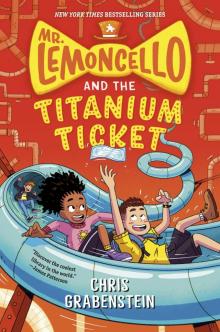 Mr. Lemoncello and the Titanium Ticket
Mr. Lemoncello and the Titanium Ticket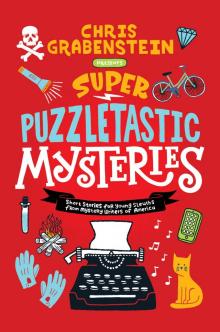 Super Puzzletastic Mysteries
Super Puzzletastic Mysteries Sandapalooza Shake-Up
Sandapalooza Shake-Up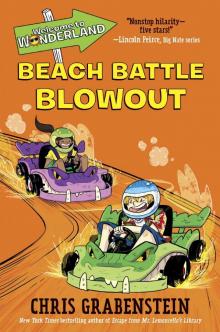 Welcome to Wonderland #4
Welcome to Wonderland #4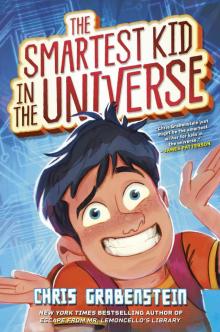 The Smartest Kid in the Universe
The Smartest Kid in the Universe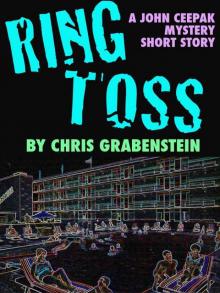 RING TOSS A John Ceepak Mystery Short (The John Ceepak Mysteries)
RING TOSS A John Ceepak Mystery Short (The John Ceepak Mysteries)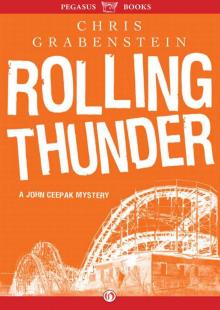 Rolling Thunder (John Ceepak Mystery)
Rolling Thunder (John Ceepak Mystery) Don't Call Me Christina Kringle
Don't Call Me Christina Kringle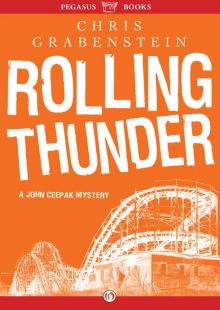 Rolling Thunder
Rolling Thunder The Crossroads
The Crossroads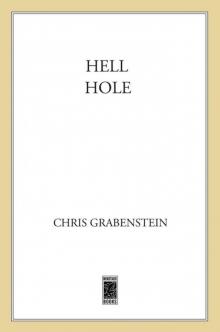 Hell Hole
Hell Hole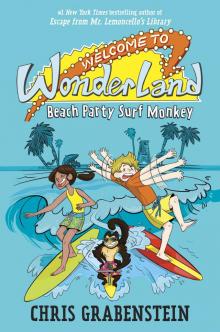 Beach Party Surf Monkey
Beach Party Surf Monkey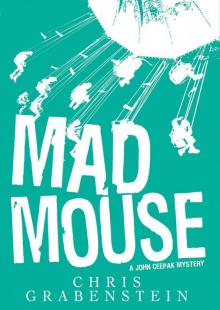 Mad Mouse: A John Ceepak Mystery (The John Ceepak Mysteries)
Mad Mouse: A John Ceepak Mystery (The John Ceepak Mysteries)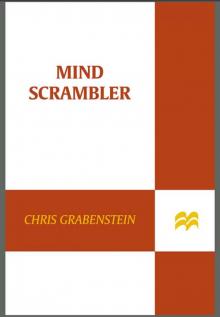 Mind Scrambler
Mind Scrambler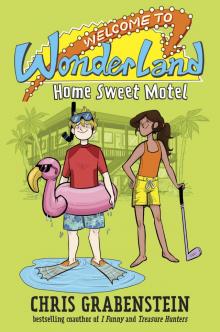 Home Sweet Motel
Home Sweet Motel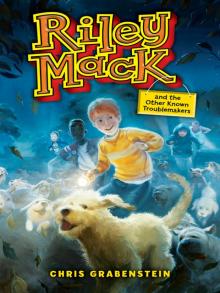 Riley Mack and the Other Known Troublemakers
Riley Mack and the Other Known Troublemakers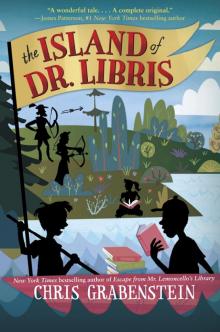 The Island of Dr. Libris
The Island of Dr. Libris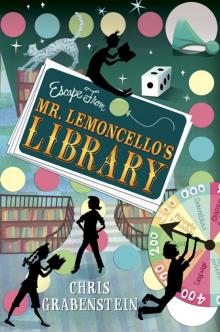 Escape From Mr. Lemoncello's Library
Escape From Mr. Lemoncello's Library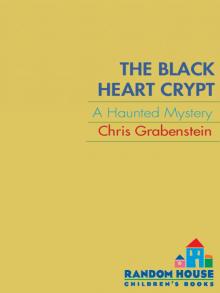 The Black Heart Crypt
The Black Heart Crypt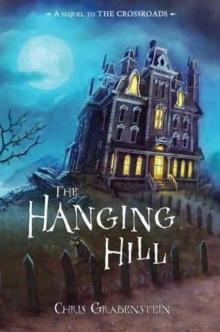 The Hanging Hill
The Hanging Hill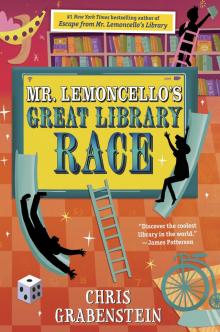 Mr. Lemoncello's Great Library Race
Mr. Lemoncello's Great Library Race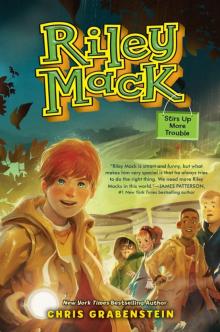 Riley Mack Stirs Up More Trouble
Riley Mack Stirs Up More Trouble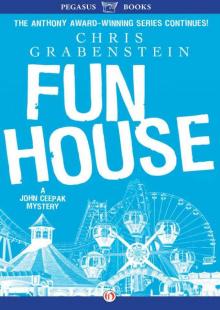 Fun House (John Ceepak Mystery)
Fun House (John Ceepak Mystery)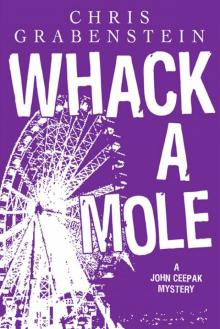 Whack A Mole: A John Ceepak Mystery (The John Ceepak Mysteries)
Whack A Mole: A John Ceepak Mystery (The John Ceepak Mysteries)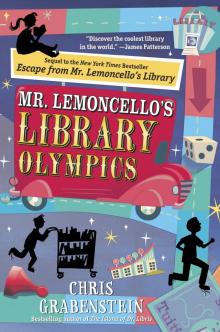 Mr. Lemoncello's Library Olympics
Mr. Lemoncello's Library Olympics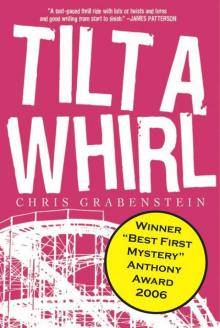 Tilt-a-Whirl jc-1
Tilt-a-Whirl jc-1 The Explorers’ Gate
The Explorers’ Gate The Smoky Corridor
The Smoky Corridor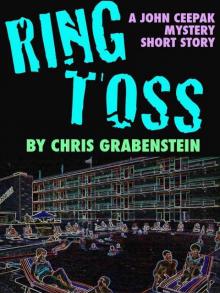 Ring Toss (john ceepak)
Ring Toss (john ceepak)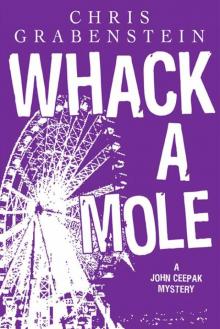 Whack A Mole jc-3
Whack A Mole jc-3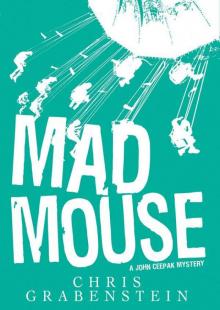 Mad Mouse js-2
Mad Mouse js-2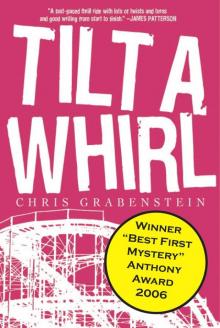 Tilt-a-Whirl (The John Ceepak Mysteries)
Tilt-a-Whirl (The John Ceepak Mysteries) Free Fall
Free Fall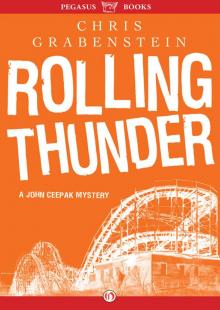 Rolling Thunder jc-6
Rolling Thunder jc-6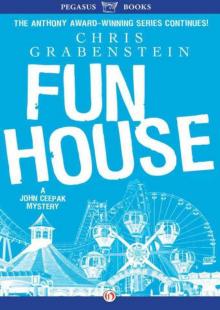 Fun House jc-7
Fun House jc-7